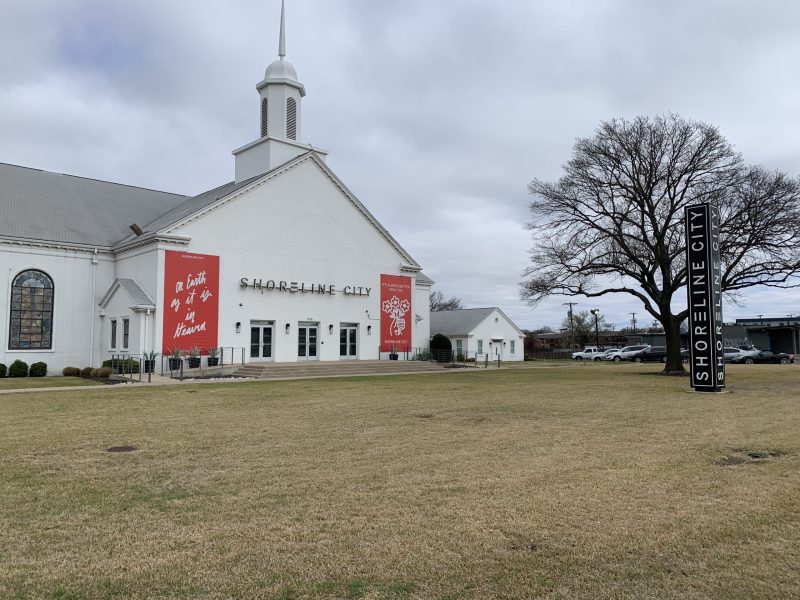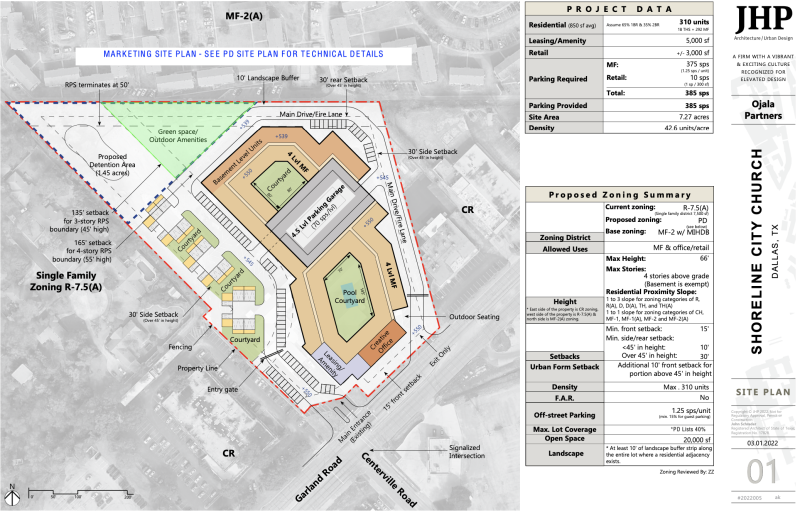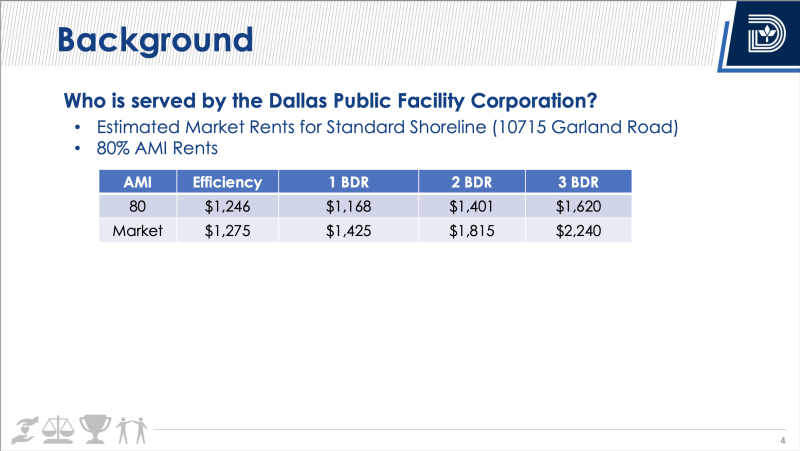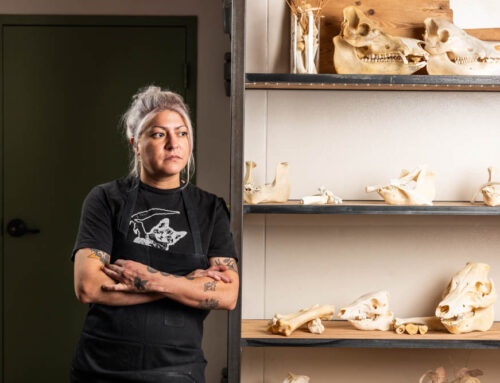
Shoreline Church. Photo by Sam Gillespie.
Shoreline Church is under contract to a multifamily developer who has filed a rezone application (here) to build an apartment project on the 7.3-acre site.
Dallas-based Ojala Holdings is asking the Plan Commission and City Council to rezone the site, located at 10751 Garland Road at Centerville Road (aerial here), to a Planned Development District (PD) for MF-2(A) uses.
“The Standard Shoreline,” says Dan Smith, a managing director at Ojala, “is a proposed Class A, mixed-use development that includes traditional multifamily rental units, two-story rental homes, 3,000 square feet of creative office space and over 20,000 square feet of green space.”
Ojala would demolish all existing church structures and build 310 new rental units. A parking garage would be “wrapped” by 292 units in four stories adjacent to 18 townhome units with separate entrances and parking garages. The mix will be studio, one-bedroom, two-bedroom and three-bedroom units with an average size of 855 square feet. The exterior will be a composite of brick, stone, glass and siding. A site plan is shown here:

Shoreline site plan.
The Standard Shoreline will be the third multifamily rezone request on Garland Road in the last twelve months. It will be the first with over 50% of the units reserved for attainable, affordable rents under new City of Dallas programs.
History
Dorothy O’Brien, a Lochwood resident of 60 years, says the Pearl and Bryan Church of Christ moved from that downtown intersection in 1955 to a newly constructed church at the Garland Road address. The church was renamed Garland Road Church of Christ. She and her husband, Hal, were the first couple married in the new sanctuary.
The congregation moved again in 1983, this time east of the intersection of Walnut Hill and Plano Road. They built a new church, Highland Oaks Church of Christ.
The Garland Road church building was bought and sold by several non-denominational churches since 1983 and, according to DCAD records, was acquired by Shoreline Church in 2016. Shoreline has outgrown the building and is now, in an interesting twist, purchasing the Highland Oaks church campus, prompting the sale of 10715 Garland Road to developer Ojala. According to Highland Oaks officials, no decision on their relocation has been made.
Even though the site is bounded by an office building to the west, a day care to the east, multifamily to the north and Garland Road to the south, the entire site is currently zoned R-7.5(A) for single-family development. The code describes R-7.5(A) as “intended to be composed of single family dwellings together with public and private schools, churches and public parks essential to create basic neighborhood units.” Churches are an approved use in R-7.5(A), which is all this site has been used for since 1955.
Mixed use, mixed income development
Matt Vruggink, a partner at Ojala, lives in Lakewood and has been watching redevelopment along the Garland Road corridor.
“The corridor to the east of Peavy Road has been overlooked for years, and we believe a quality, mixed-use development such as The Standard may serve as a catalyst to spur positive growth to the east,” Vruggink says.
Ojala is using new City of Dallas programs called Mixed Income Housing Development Bonus (MIHDB) and the Dallas Public Facility Corporation (PFC). The programs are a complex set of rules, regulations and negotiations for the City of Dallas to achieve attainable, affordable housing goals.
According to Ojala, the program for The Standard Shoreline includes granting the development a property tax exemption and an increase in height (bonus) from the MF-2 limitation of 36 feet to the proposed height of 66 feet. In return the City of Dallas earns annual fees, a profit-sharing position and a developer promise for an attainable, affordable housing component. In the case of The Standard Shoreline , Ojala is committing to lease 49% of the units at market rents and 51% of the project to residents at or below 80% of the Dallas Area Median Income (AMI). According to the City of Dallas, the Dallas AMI is $62,300 for a single person and $89,000 for a family of four. This table from a recent City of Dallas briefing shows the difference between market rents at The Standard Shoreline and attainable, affordable rents at 80% AMI for the same unit.

AMI rents for Shoreline.
Smith and Vruggink hear people object to the project’s “low-income” housing. They hope to use neighborhood meetings to educate residents that 80% AMI for a family of four is over $70,000, far from what most people think of as “low income,” but right where many young teachers, nurses and police officers are.
Ojala intends to use the 3,000 square feet of office space as an artist’s residency program. They have been in contact with local arts organizations to design a space that will be a workplace and a showcase for local artists.
Neighborhood perspective
The Lochwood neighborhood sees change coming, and many residents aren’t on board. Scott Robson, a Lochwood resident of 27 years and president of the Lochwood Neighborhood Association for 20 years, shares his perspective in a letter to Shoreline leadership with copies sent to East Dallas business people and government officials.
“Of course this proposed rezoning means different things to the different parties,” Robson says. “To Shoreline City Church it means millions of dollars and the ability to move out of the neighborhood to its new home. To the broker(s) it means a personal financial windfall. To some downtown it scores them political points. To the apartment builders it’s good money in the pocket. But, the neighbors you will hear from have nothing to gain financially or politically (some of whom are first- and second-generation homeowners, having lived in this neighborhood since the 1950s — when the church was first built), they will voice a longing to preserve for both themselves and the generation to follow their livelihoods and the peaceful, relatively low-crime community they’ve worked hard to maintain, with no desire of moving out to a new home.
“If the proposed rezoning proves to be a win-win where no one loses, then it should most certainly go forward,” Robson continues. “However, if it is a win-lose proposition, if some of your neighbors lose in this deal, then that would be wrong and an injustice, in which case we would appeal to your sense of Christian duty, over money and expediency, to cut ties from this proposal and seek a new buyer.”
The Advocate reached out to Shoreline about Ojala’s acquisition of the Church and the rezone that comes along with it.
“Over the past six years, we’ve seen impressive growth and revitalization along Garland Road and its surrounding neighborhoods,” says Ron Brown, a board member and executive pastor at Shoreline, in an email. “It has been such an honor to be in this neighborhood for the last seven years and we are thankful that since 2016, families from East Dallas and beyond have found a sense of ‘home’ within our church and this special area of Dallas. We have watched as countless families put down their roots here — purchasing homes, supporting the incredible local businesses and starting businesses of their very own. It’s been beautiful to see so many people find a spiritual home at this location. We are excited to see that people could find a beautiful personal home in this same place. We look forward to the continued expansion of the health and growth of this community. Shoreline will continue to be invested and involved in the Garland Road community.
Neil Felder owns the East Lake Medical Center Office building next door to Shoreline.
”I am just uncertain about the project,” Felder says. “I heard about it first from the Lochwood neighbors, not the developer, which is unusual to me. I did eventually speak to the Ojala team but still have my doubts.”
Kyle Bickham operates The Modern Tot daycare business on the other side and also shares a property line with the church. Bickham converted the Lucky Dog bookstore to the day care in 2018. He is currently planning an expansion of the business.
“I have met with Ojala regarding the project,” said Bickham. “I’m not prepared to take a position for or against their plans yet. I am not anti-development, but I have concerns about the safety and privacy of our children.”
Tom Buck, a Lochwood neighbor and chair of the communication and sponsorships committee of the neighborhood association, also weighs in.
“One word the city uses repeatedly with these developers is that they are ‘voluntarily’ agreeing to provide affordable housing. We believe the city is pushing incentives/bonuses/tax benefits to trigger this ‘voluntary’ agreement for city approval,” Buck says. “We are not against providing affordable housing. But why 51% when the approved Trailhead and developed Doverhouse are only 8-9%? Why is our area on Garland Road and our neighborhood — already flushed with affordable housing from two other complexes — asked to absorb so much?”
Although technically separated by Garland Road from the site, the Greater Casa View Alliance leadership also intends to review the project to ask questions and share opinions. The Greater Casa View Alliance includes 36 neighborhood associations south of Garland Road from Highland Road all the way to Interstate 635. Mike Nurre, a longtime leader in Casa View, says a meeting has been scheduled with Ojala, and the board will be polled for a decision.
Neighbors, business owners, Plan Commission member Michael Jung and Ojala have all confirmed attendance for a neighborhood meeting sponsored by the Lochwood Neighborhood Association. The presentation and discussion is set for April 12 at 6:30 p.m. at the Knights of Columbus Hall at 10110 Shoreview Road.
The vision for Garland Road
In 2006, District 9 Council member Gary Griffith formed a task force to help plan changes and improvements to Garland Road. Four years later, the city adopted the Garland Road Vision (GRV) plan. The GRV remains an important document for neighborhoods and developers seeking guidelines for changes proposed to real estate along Garland Road.
Architect Gerry Worrall, one of the original task force members, remains active in reviewing new Garland Road developments in context of the plan. Worrall says he expects to help form a subcommittee of task force members and non-task force members to review Ojala’s project, participate in public meetings and share their opinions with the Plan Commission and City Council.
Change has come since GRV was adopted, most of it improving the dining experiences of East Dallasites who got used to driving past the spillway on their way to a good meal. It started in 2011, when Goodfriend turned a boarded-up building on Peavy into a burger joint with a vibe that drew both the cool crowd and families. Since then Garland Road has seen Smoky Rose, Hello Dumpling, ZAAP Kitchen, Maya’s Mediterranean and Here open. Coming soon are Rodeo Goat and Ellen’s.
Momentum is also with large, multifamily projects. Newly opened Doverhouse Apartments at 9343 Garland Road was the first development of its kind constructed in over five years in the area. One of its features is an Ascension Coffee, planned for a restored chapel that was saved from demolition. Mill Creek was successful in rezoning the parcel at the 3G intersection where The Lot and Local Traveler once fed families. Developer Larkspur Capital is redeveloping the Garland Road Thrift Store site to 70 rental units.
The Shoreline rezone will test many things — neighborhood changes, developer opportunities, church commitments, affordable housing, building heights, municipal engagement and visions of the future. Buckle up.





